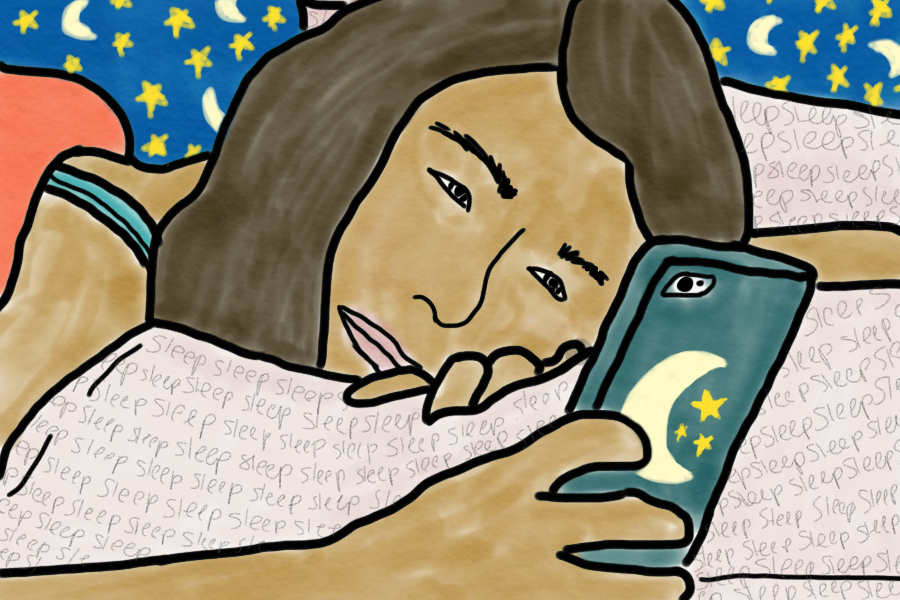Your house is silent. Your covers are pulled up over your head. Your face is washed over with the slightly sickening, pale glow of your phone, and your pallid complexion is fitting for the situation. You are so tired, your eyelids droop as TikTok after TikTok scrolls past your reddening eyes. So, why haven’t you gone to sleep yet?
Scientists say one reason might be rooted in biology. Insomnia specialist and sleep researcher Wendy Texel mentioned in her TEDx Talk that the average teenage body tends to release the hormone melatonin at around 11 p.m., two hours later than adults and younger children. Without the production of melatonin, we will have trouble falling asleep.
Some of us scoff when we see 11 p.m., because we will see the wee hours of the morning and then sleep through half the day. Researchers at the University of Michigan theorized that as we become a teenager, our hormones drive us to want to be more independent. The wee hours of morning when adults aren’t around just so happen to be the perfect time during which we can do what we want. When our parents aren’t awake, and the world is dark and silent, it’s a lot easier to pretend we don’t answer to or depend on anyone.
Some of us take this time to have deep Snapchat conversations about existential crises with our friends. But others, the introverts amongst us, might use it to take a break from social interactions. It’s sacred time to yourself. Even during quarantine, when we literally don’t leave our houses, school days are still filled with Google Meets and Zooms and even FaceTime with friends. This does not mean introverts don’t enjoy social interactions, they might just need some time to recharge, plentiful between 12 and 2 a.m.
As teenagers, it is widely accepted that we need eight to 10 hours of sleep every night. Researchers are divided as to whether these hours are only effective when you sleep and wake at “reasonable” hours, or if it’s alright to go to bed late as long as you sleep in the next day. Some say night owls are putting their health at serious risk, while some chronobiologists recommend following one’s own biological clock, even if it has you sleep late.
While the field of sleep science yields varying results, there are enough reasons explaining why we like staying up late to justify it, especially when we are able to sleep in later the next morning. Take this time to sleep. Get a lot of it, and relish every minute. August is coming sooner than you think, and before you know it, we will be sitting in desks at 7:35 a.m.




![Sitting courtside before a junior varsity girls’ tennis match, senior Tanisi Saha rushes to finish her homework. Saha has found herself doing academic work during her athletic activities since her freshman year. “Being in sports has taught me how to stay organized and on top of my schoolwork. [With] a busy practice and game schedule, I’ve learned to manage my homework and study time better,” Saha said.](https://pwestpathfinder.com/wp-content/uploads/2025/11/DSC_0022-1200x800.jpg)
![Sophomore Maryem Hidic signs up for an academic lab through Infinite Campus, a grading and scheduling software. Some students enjoyed selecting their responsive schedule in a method that was used school-wide last year. “I think it's more inconvenient now, because I can't change [my classes] the day of, if I have a big test coming and I forget about it, I can't change [my class],” sophomore Alisha Singh said.](https://pwestpathfinder.com/wp-content/uploads/2025/10/DSC_0012-1200x801.jpg)
![Senior Dhiya Prasanna examines a bottle of Tylenol. Prasanna has observed data in science labs and in real life. “[I] advise the public not to just look or search for information that supports your argument, but search for information that doesn't support it,” Prasanna said.](https://pwestpathfinder.com/wp-content/uploads/2025/10/DSC_0073-2-1200x800.jpg)
![Junior Fiona Dye lifts weights in Strength and Conditioning. Now that the Trump administration has instituted policies such as AI deregulation, tariffs and university funding freezes, women may have to work twice as hard to get half as far. "[Trump] wants America to be more divided; he wants to inspire hatred in people,” feminist club member and junior Clara Lazarini said.](https://pwestpathfinder.com/wp-content/uploads/2025/05/Flag.png)
![As the Trump administration cracks down on immigration, it scapegoats many immigrants for the United States’ plights, precipitating a possible genocide. Sophomore Annabella Whiteley moved from the United Kingdom when she was eight. “It’s pretty scary because I’m on a visa. When my visa expires next year, I’m not sure what’s going to happen, especially with [immigration] policies up in the air, so it is a concern for my family,” Whiteley said.](https://pwestpathfinder.com/wp-content/uploads/2025/05/DSC_0077-7copy.jpg)
![Shifting global trade, President Donald Trump’s tariffs are raising concerns about economic stability for the U.S. and other countries alike. “[The tariffs are] going to pose a distinct challenge to the U.S. economy and a challenge to the global economy on the whole because it's going to greatly upset who trades with who and where resources and products are going to come from,” social studies teacher Melvin Trotier said.](https://pwestpathfinder.com/wp-content/uploads/2025/05/MDB_3456-1200x800.jpg)



![Some of the most deadly instances of gun violence have occurred in schools, communities and other ‘safe spaces’ for students. These uncontrolled settings give way to the need for gun regulation, including background and mental health checks. “Gun control comes about with more laws, but there are a lot of guns out there that people could obtain illegally. What is a solution that would get the illegal guns off the street? We have yet to find [one],” social studies teacher Nancy Sachtlaben said.](https://pwestpathfinder.com/wp-content/uploads/2025/01/DSC_5122-1200x800.jpg)

Rick Biswas • Oct 18, 2020 at 10:37 pm
Wow, I was so sure staying up late was real harmful over the weekends. Now I can stay up till 2 knowing I am not doing anything wrong lol.